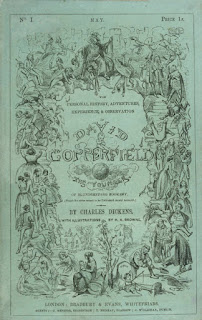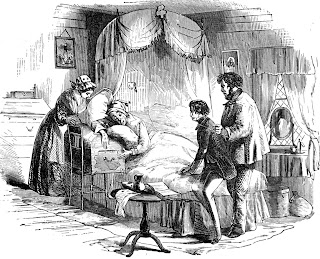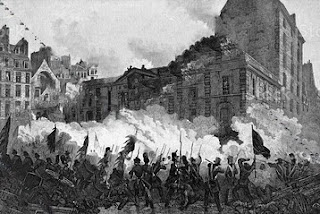-: David Copperfield, a portrait of Dickens' own life :-
There is a basic conceptual difference between the term 'Autobiography' and the literary epithet 'Autobiographical'. An autobiography falls within the generic category of what is called nowadays as life writing. It is one's own biography and because of the form promises to see the subject from its interior, it enjoys instant popularity. This type of novel, in general, did not become really personal till the Victorian Age, with such production as Villette Agnes Grey, and some of the novels of Dickens and George Eliot, and even here there remained a considerable distance between the person who suffered and the mind which created. An autobiographical work takes something from the form of autobiography, but it is essentially different in its composition. The very epithet that names the form clearly suggests that while one would find elements of the personal life of the author, the work is bound to be a kind of fictionalization of that. In our study of the personal, autobiographical elements in David Copperfield, we would focus on this intermixing of personal elements and fictionalization that goes through the novel.
 |
| Cover page of the first edition |
In the preface to the 1867 edition of David Copperfield, Dickens remarked:
Like many fond parents, I have in my heart of hearts a favourite child. And his name is David Copperfield.Perhaps Dickens was especially fond of David Copperfield because ostensibly, there are few similarities between David and Dickens concerning their childhood, parental care, education and career. Dickens commented in 1850 "I do not find it easy to get sufficiently far away from this book". Even the name of the protagonist has invited initials of that of the author. Dickens' childhood and the emotional trauma he had in his experience at school get reflected in David's similar ordeals. Like David, Dickens was also first taught at home by his mother and was later sent to the Wellington Academy of Mr. Jones which is akin to David's Salem House headed by Mr. Creakle. Like Dickens, David is the victim of circumstances. He is employed under sordid conditions at Murdstone and Grinby's is reminiscent of Dickens' going to work at Warren's Blacking Factory at such a tender age. Even the career line of David and Dickens are almost similar. Like Dickens, David starts his literary career as a reporter in parliament and then becomes a successful novelist. David's infatuation and subsequent marriage with Dora Spenlow are also reminiscent of Dicken's relationship with Maria Beadnell in his early youth. Dickens and Catherine's married life was unhappy as was David's married life with Dora. Again, Dora dies soon after and David married Agness who became an ideal wife. Similarly, Dickens had loved Mary, Catherine's sister.
 |
| A visit to the ailing mother and David |
However, the closest to Dickens' own life is the representation of the senior characters of the novel. Both Dickens' father (John Dickens) and Mr. Micawber are poor and have to support a large family. Both of them have sent to the debtor's prison for being unable to repay their debts. Dickens used to visit his imprisoned father. Similarly, David also visits Micawber in prison. Dickens' father could also be the source of the inextinguishable optimism, shiftlessness, irresponsibility, waywardness and eloquence that we find in Micawber. And poor careworn Mrs. Micawber elastically recovering from fainting fits to eat lamb chops and drink warm ale is drawn from Elizabeth Dickens as she was in Bayham Street and Gower Steet. Mr. and Mrs. Micawbers are pen-portraits in the like of Dickens' parents. The young docile mother of David is a kind of representation of Dickens' own mother as well. The word "Dick" meaning male genital, is an allusion to represent the ineffectuality and naivety of Mr. Dick in the family where he lives.
However, sometimes the autobiographical element also reaches the subtextual level and episodes that provide important turns of action in the novel bring out Dickens' own perception of the course of his own life. We have seen that David's mother has an early death. Dickens' mother, however, lived a normal life span; but we can understand a little bit of the psychological work in Dickens if we remember the autobiographical fact that it was Dickens' mother who was particularly eager to send him to work under the adverse conditions of the blacking factory. Thus, the premature death of David's mother is not so much a literal reflection than a symbolic correlative of the withdrawal of maternal protection early in life and pushes him cast into a bottomless abyss of pain. The Murdstones and Micawbers represent the different facts or aspects of Dickens' parents' personality affecting young Charles.
Walter Allen remarks,
There is, however, a great deal of mingling of facts and fancy in David Copperfield, and it is unjust to consider it as pure autobiographical in inspiration.In many chapters of the novel, we find similarities of incidents with Dickens' own life and there is no doubt. But one critic has pointed out that it "is his life as he would fain have reconstructed it". It is this fictionalization that leads a different dimension to the novel, predicating of what Dickens' life would have been if things have gone otherwise. Finally, we can say that the affection and emotional intimacy Dickens have with his novel David Copperfield is quite evident in his words (from the preface to the 1867 edition of David Copperfield) :
Of all my books, I like this the best.





No comments
Thanks for your valuable opinion. Your comment inspires us a lot to do better time and again.